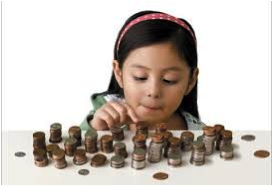 Where did you learn about money? From school, from your parents, from a life of hard knocks?!
Where did you learn about money? From school, from your parents, from a life of hard knocks?!
Well, you as a parent are the most influential teacher your child will ever have, and specifically the mom when it comes to finances, if you can believe that!
Often parents are overwhelmed about how to teach their kids about money. Where to start?
WHY do parents need to teach their young kids about money?
 Like it or not, your child’s future will be significantly affected by how you use money on a day-to-day basis. Modeling or learning by observation from someone they trust is the best way for kids to learn.
Like it or not, your child’s future will be significantly affected by how you use money on a day-to-day basis. Modeling or learning by observation from someone they trust is the best way for kids to learn.- Starting early is critical – this is when their minds absorb the most and when habits and family values are developing.
- It is easier to teach a toddler than a teenager!
- Most schools don’t have a money management curriculum.
- Learning how to manage money is a life skill. Just like swimming and catching a ball – kids need practice.
- Kids need basic numeracy skills – using money is a great tactile way to learn. How many times have you had a teenage cashier that can’t make your change if you give them extra?
So HOW do we teach them?
 Use cash. Especially in front of young children. Studies show we end up spending about 20% more when we use plastic (either debit or credit) than cash. Handing cash over and counting out each bill seems to trigger a pain centre in the brain. Not as engaging, plastic yields no such hesitation or pain (until the bill shows up!). Kids need a visual to understand the value.
Use cash. Especially in front of young children. Studies show we end up spending about 20% more when we use plastic (either debit or credit) than cash. Handing cash over and counting out each bill seems to trigger a pain centre in the brain. Not as engaging, plastic yields no such hesitation or pain (until the bill shows up!). Kids need a visual to understand the value.
Provide allowance. Give your children a weekly or bi-weekly allowance, consistently. Provide them with very clear guidelines as to what they are expected to cover with their money.
Let them make their own mistakes. As parents, this is often the hardest part. However, money management is an experiential skill. This means that we have to do it and experience it to learn it. That’s why there are loads of personal finance books out there and Canada still has the highest consumer debt load in its history. Kids need to learn (and a lot of adults too actually) that money is finite. Once it is gone, it is gone. This takes practice, and sometimes pain.
 Goal setting. It’s never too early to start thinking about what’s important and how to get there. We can talk logic, needs and wants all day to kids. It usually doesn’t sink in or stick at all. Emotion drives decision, especially when it comes to saving and spending. The key is to inspire or motivate children towards saving for something they really want. Connect their money to a purpose.
Goal setting. It’s never too early to start thinking about what’s important and how to get there. We can talk logic, needs and wants all day to kids. It usually doesn’t sink in or stick at all. Emotion drives decision, especially when it comes to saving and spending. The key is to inspire or motivate children towards saving for something they really want. Connect their money to a purpose.
 Be supportive. As kids grow in a warm and positive environment, they can learn from their mistakes and build self-confidence. Be patient when they want EVERYTHING. Remember, their whining for stuff does not mean they are ungrateful for all the blessings they do have; they are subject to just as much media telling them to want new stuff as adults are, or more.
Be supportive. As kids grow in a warm and positive environment, they can learn from their mistakes and build self-confidence. Be patient when they want EVERYTHING. Remember, their whining for stuff does not mean they are ungrateful for all the blessings they do have; they are subject to just as much media telling them to want new stuff as adults are, or more.
Just say NO! It sounds simple, but as every parent knows, it’s sometimes the most difficult word to utter. Sometimes it might even seem easier just to say “Yes”, but in the long run you’ll be doing your child much more harm than good.
